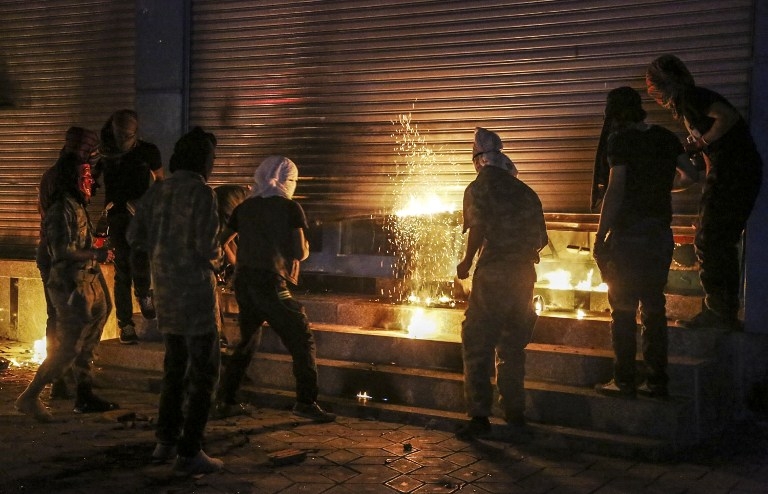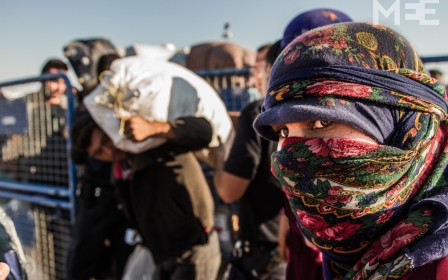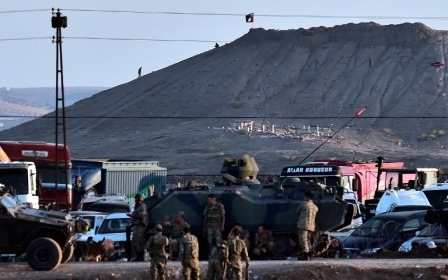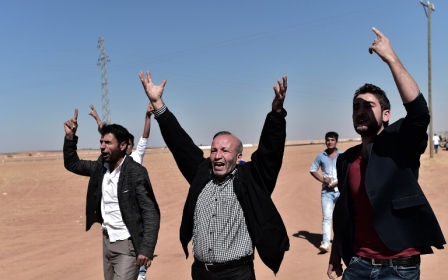As tense fighting continues in Kobane, Turkey unrest spirals

As Islamic State fighters tightened their grip on a Kurdish Syrian border town on Tuesday - firing missiles and raising black flags on mountains overlooking the city - protests erupted across neighbouring Turkey, reigniting tensions there between the government and the country’s Kurdish population.
In the latest sign that Syria’s civil war is reverberating across borders, pro-Kurdish protesters took to the streets and clashed with riot police in several Turkish cities, including Istanbul, to picket government inaction against Islamic States militants who appear to be on the verge of capturing the key Syrian border town of Kobane.
At least 14 people were killed and dozens more wounded across Turkey, dimming prospects of a long-sought after peace agreement between Ankara and Turkey’s Kurdish minority.
“The feeling amongst Kurds is that Kobane is about to be taken and still nothing has been done, a massacre, a true humanitarian catastrophe, looms and there is still no real political pressure on the Turkish government to do anything,” Cevat Dirgon, an IT consultant who took part in pro-Kurdish demonstrations in Istanbul told MEE by telephone.
“It's the 21st century, 2014. This is not an age when we stand by and watch massacres,” Dirgon said.
After Turkish President Recep Tayyip Erdogan warned on Tuesday that the strategically important Kurdish town was "about to fall", saying a ground operation was needed to defeat the militants, unrest broke out in towns and cities across the mountainous south-east where the majority of Turkey’s 25 million Kurds live.
In Diyarbakir, the second largest city in Turkey’s south-east, and the scene of the fiercest riots, police moved in with anti-personal vehicles and fired tear gas and water cannons to disperse the crowds. A daylong curfew has now been imposed and all flights out of the town cancelled.
In another town, Başkale, close to Turkey’s border with Iran a statue of Mustafa Kemal Ataturk, the founder of the Republic of Turkey, was doused in petrol and set alight.
Turkey’s Kurds, who comprise between 10 percent and 25 percent of the population, were promised an independent homeland at the Treaty of Sevres, signed by the Allies of the First World War. But this dream was quashed following the creation of the Turkish Republic.
A full-scale insurgency began in 1984, when the Kurdistan Workers Party (PKK), a militant organisation demanding self-determination, announced a Kurdish uprising.
Last year, the jailed PKK leader Abdullah Ocalan declared the end of armed struggle and said that a ceasefire had been agreed and that peace talks would now begin, raising hopes that a settlement might end decades of violence.
With violence spiralling, however, analysts say, those discussions are sliding into irrelevancy.
“What’s happening has radicalised the PKK and its sympathisers, they see Kobane as a symbol of Kurdish dignity. Erdogan, who says he’s a friend of the Kurds, has done nothing,” said a Turkish writer and translator from Ankara who did not wish to be named.
"Within the PKK there’s a belief that IS and Erdogan are two sides of the same coin, that Erdogan has been helping IS to destroy Kurdish dreams of independence. Whether that's true or not a lot of what was gained in the negotiations might quickly be lost,” the writer told MEE by telephone."The central government is turning away from the PKK in negotiations, the PKK representatives are saying we’re on the brink of war, the ceasefire is over."
New MEE newsletter: Jerusalem Dispatch
Sign up to get the latest insights and analysis on Israel-Palestine, alongside Turkey Unpacked and other MEE newsletters
Middle East Eye delivers independent and unrivalled coverage and analysis of the Middle East, North Africa and beyond. To learn more about republishing this content and the associated fees, please fill out this form. More about MEE can be found here.




